TM visiting Booking.com
Our project development and management department once decided to go somewhere for TM-building. Everyone poked a finger at the map and it so happened that everyone got to Amsterdam. In general, everything went perfectly, we had a great time, and at the same time looked in at the office of Booking.com - the company, whose services are used by many employees of TM. There are also many habra users, including CurlyBrace , thanks to which we were able to visit the office.

3 Easter eggs under the cut.
Booking.com is an online hotel booking system, which this year marks no less than a 21 years old. To date, it aggregates hundreds of thousands of hotels in hundreds of countries, holds millions of armor, has billions of dollars in turnover - that's all. The company's headquarters is located just in Amsterdam, and to be more precise, almost in the heart of the city - on the square of the Dutch painter Rembrandt (Rembrandtplein).
')

The building itself looks either like a cathedral, or like a Big Ben: tons of gloomy narrow bricks and a clock tower on the roof.

But from a different angle, the Booking.com building looks like a modern business center (as it really is).

Booking.com occupies as many as 5 floors of the building, immodestly displacing BNP Paribas. The letters “The bank” on the input plate is first of all the name of the building itself, although there once was a bank in it (there are still bunkers with massive thick doors in the basement).
In general, the office is a few buildings in the center of Amsterdam, but we only went to the main thing. At the entrance we were greeted by the friendly Eugenia Kondryn, a Russian-speaking recruitment girl, whom we spent the next hour asking about the work of the company, so there would be not just office photos, but a salad from the photos and her answers to our questions.

The office for the most part represents openspaces that are so common in companies of this scale. Despite the large number of teams, there are very few “offices”.


But at the same time, the office has a huge number of various places where you can either retire or get together as a company. Tables, chairs, ottomans:


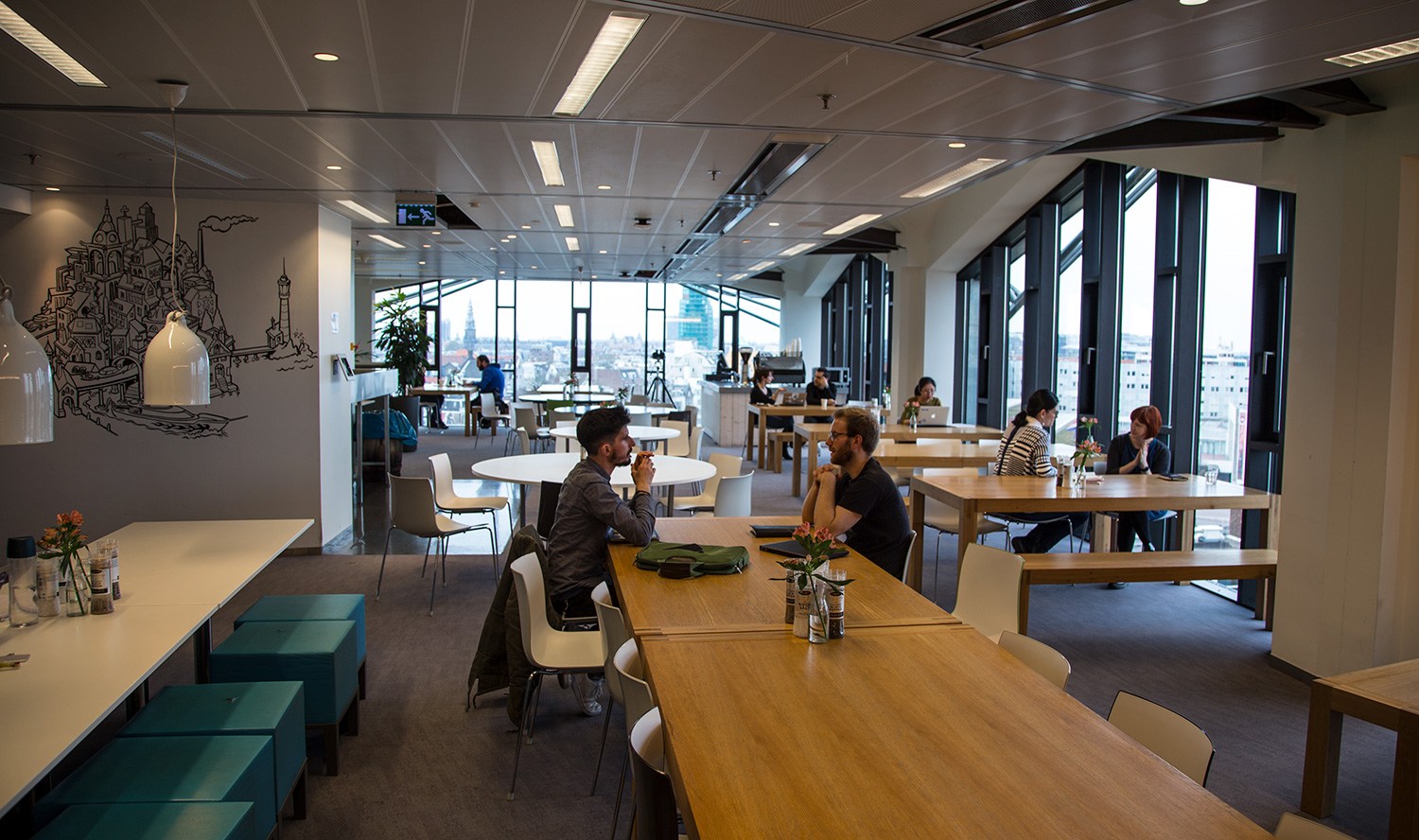




For those who miss railway romance
The office uniquely combines modern materials, high-tech and natural wood (for example, on the ceiling).

Almost every employee has 2-3 monitors. Everywhere are marker boards withtrade secrets, working inscriptions and completely non-working stickers.

Typical stationary employee workplace

Those interested can go or drive along the bike path - but what if such a provocation! Moreover, Amsterdam is the birthplace of bicycles.

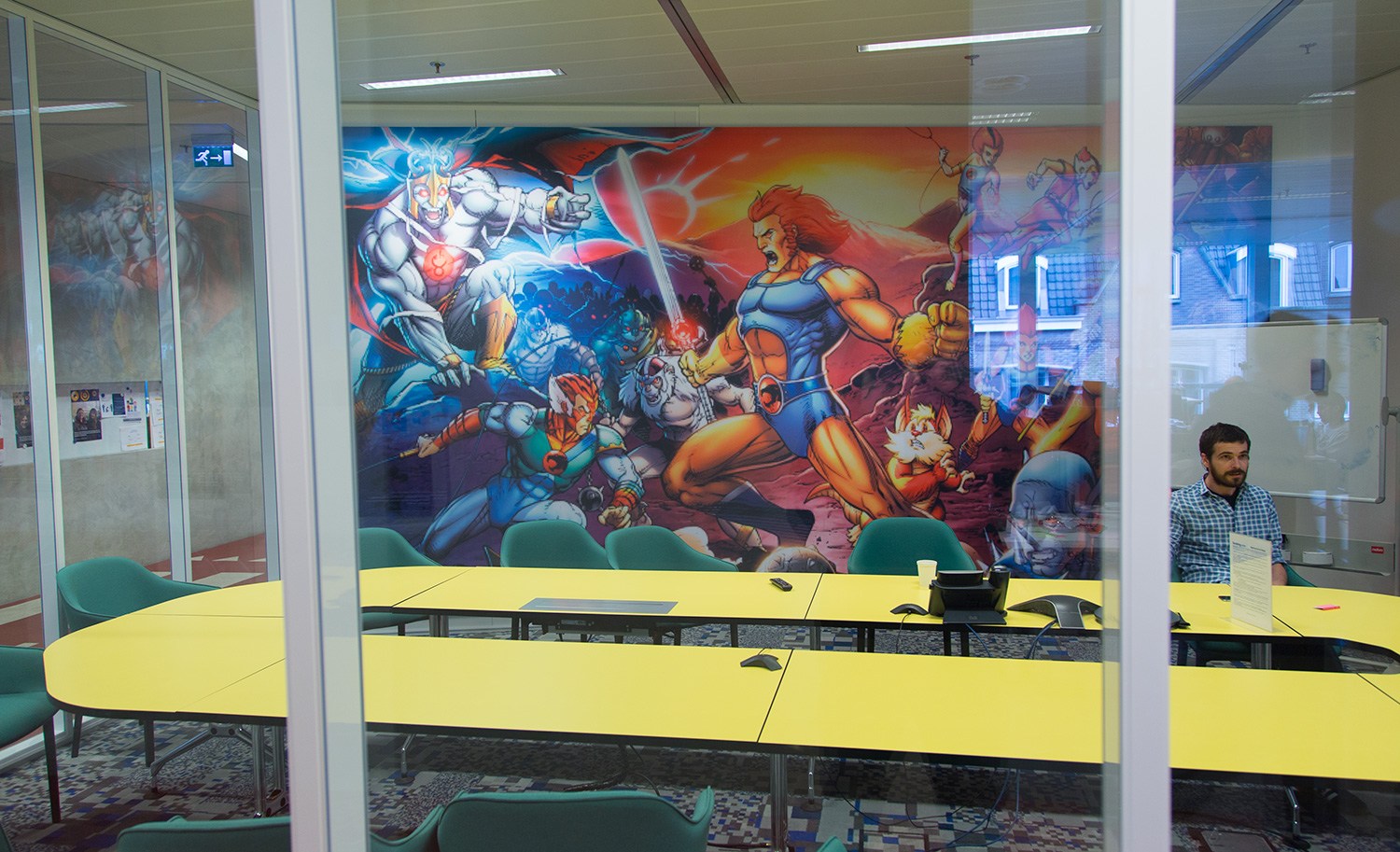
In Amsterdam, it is sometimes difficult to determine whether there is actually a gopher or not.
The office is not overloaded with furniture, soft sun loungers and other sleep capsules, everything is quite ascetic and functional - and it is pleasant to work comfortably, and it is pleasant to take rest. From entertainment, we met billiards and table tennis (which, unlike many other offices, are not just worth it, but they really play in them). By the way, great sports for a change of scenery and a quick reboot.
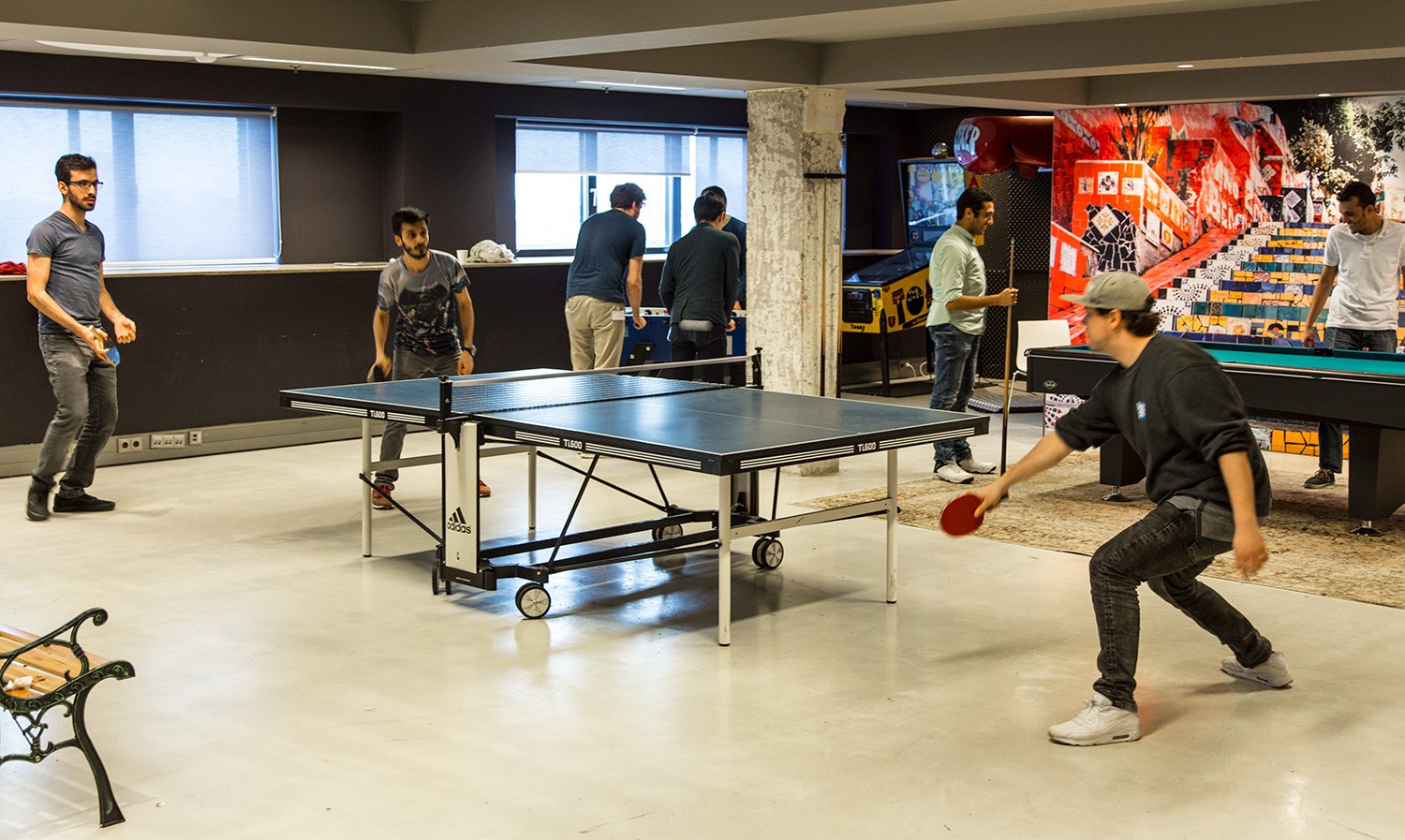
Instead of machines with soda and liver - coffee machines and such fruit boxes:
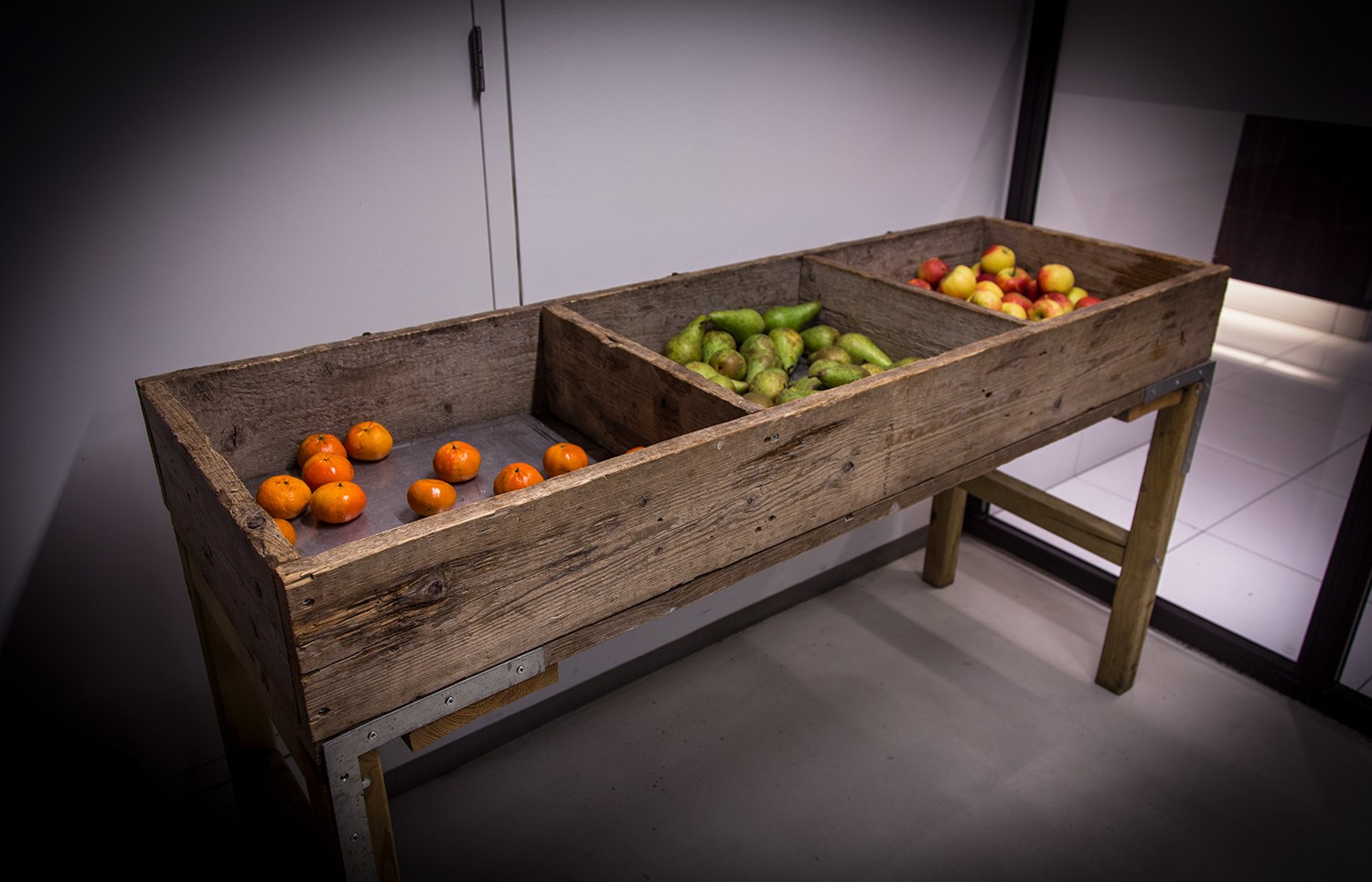
At one of the coffee machines, we found a free table where we continued to ask:

It is a great success to meet Deniskin, Valery Leontyev and Fred Durst at the same time in the office.
Along the perimeter of the office there are windows “to the floor”, thanks to which there is light in the office, and there is always something to see outside the window.

For those who are especially inquisitive, a survey point with elegant optics was found in one of the canteens - you can admire both the girls from the legendary street (but this is not certain), or simply the world around you and the rooftops, which seem to be painted on the pages of Andersen’s fairy tales.

There is a lot of greenery in the office: ficuses, sincapsus, asparagus, gladioli, gerberas, these, like them ... damn, well, I taught ... Well, in general, the greens in the office are present and it's great.
At the end of the tour we climbed to the roof, where there are also a number of jobs. True, that day in Amsterdam was cold, so the terraces were empty. But imagine how well to work, sitting on the roof and looking at the surrounding city.

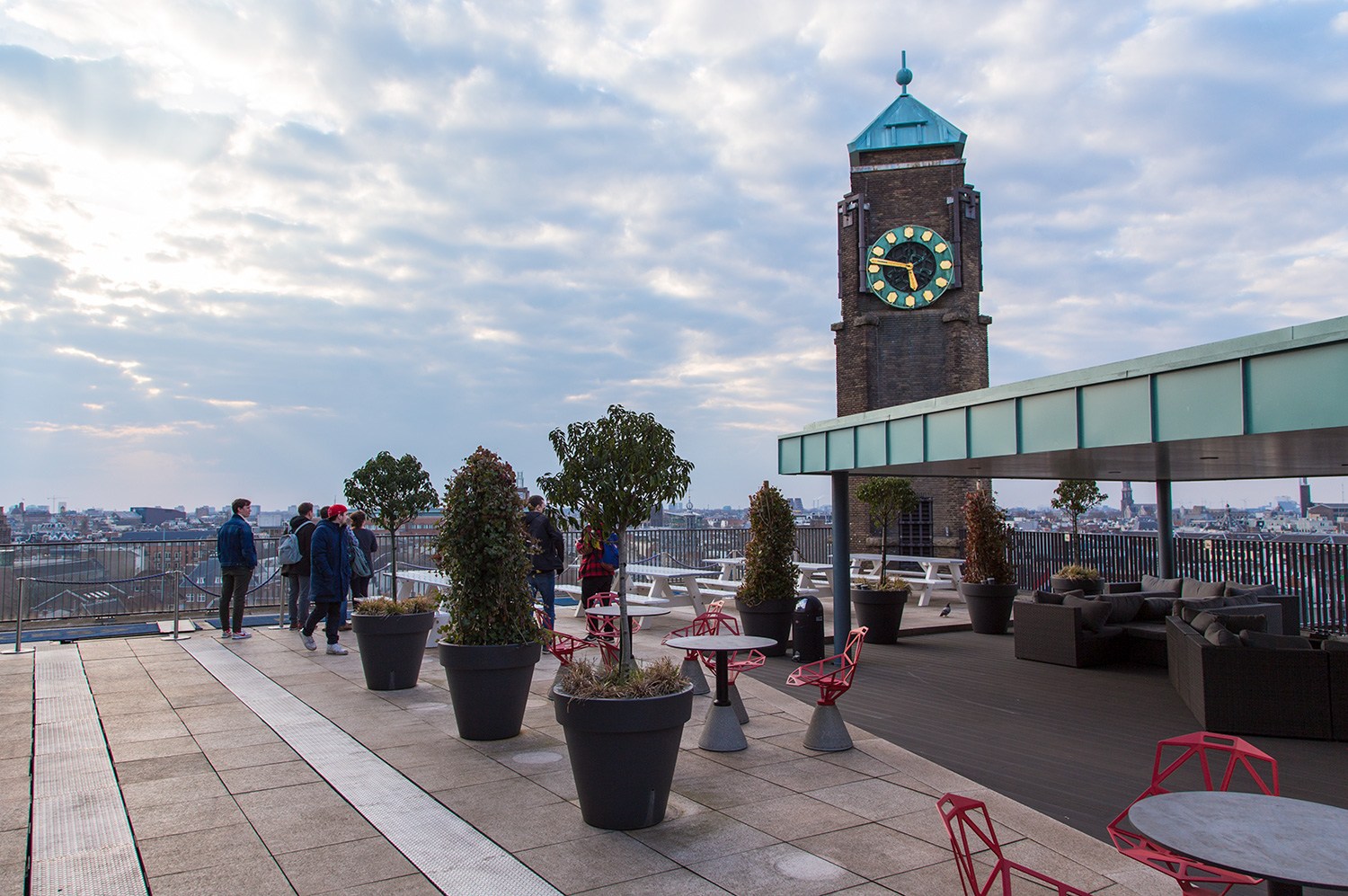



Jobs are very comfortable. The premises receive a large dose of natural sunlight, so the eyes do not get tired, and the mood does not become blacker than clouds.

From the glass office galleries, you can easily get dizzy - but the view is mesmerizing and even somewhat relaxed. I tried to convey all the vertigo of the moment in the photo. To heighten the effect, you can scroll the mouse back and forth.

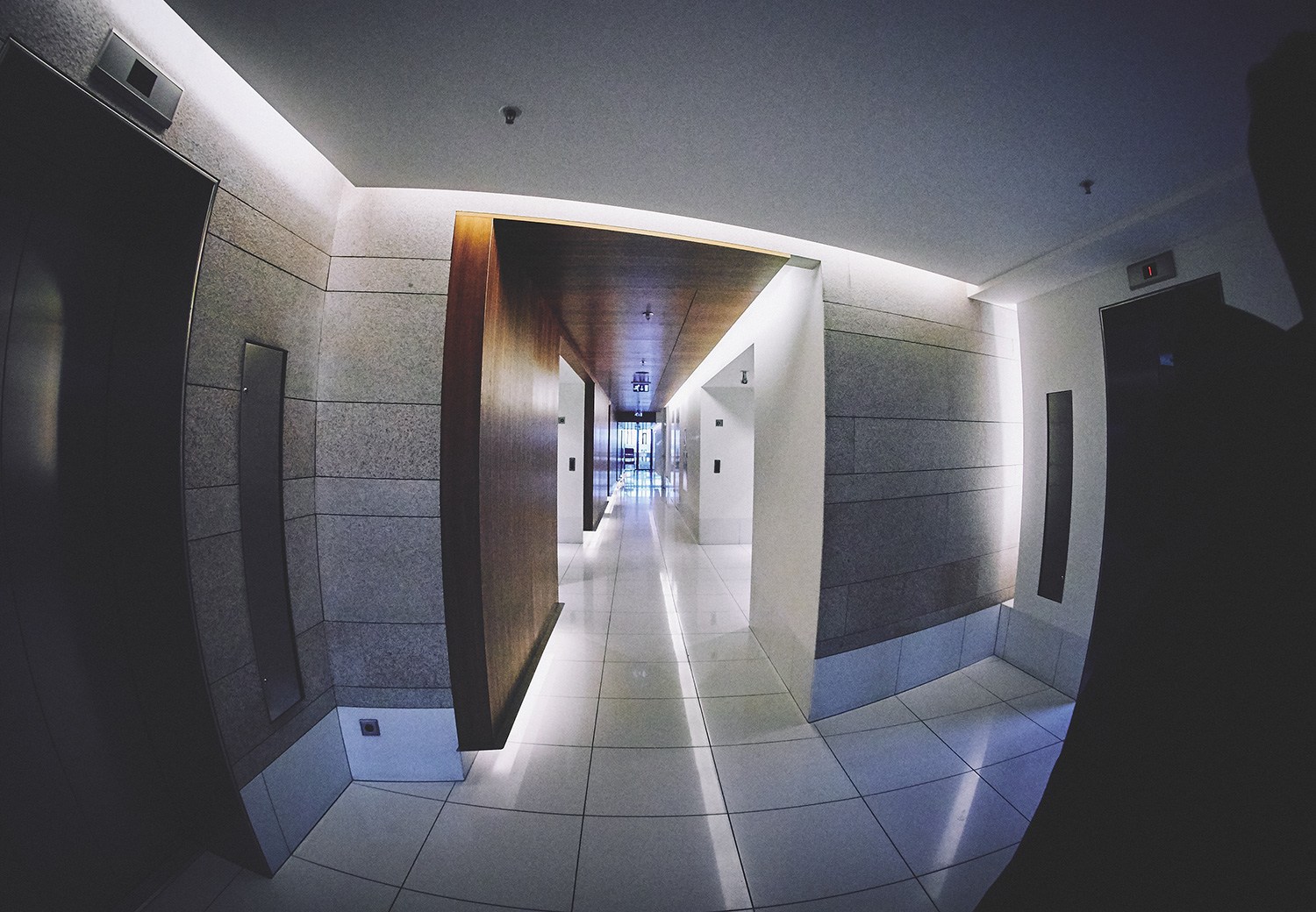
— .

, , , . - — , , Booking.com .
See also:
→ Avito: work hard, play hard

3 Easter eggs under the cut.
Booking.com is an online hotel booking system, which this year marks no less than a 21 years old. To date, it aggregates hundreds of thousands of hotels in hundreds of countries, holds millions of armor, has billions of dollars in turnover - that's all. The company's headquarters is located just in Amsterdam, and to be more precise, almost in the heart of the city - on the square of the Dutch painter Rembrandt (Rembrandtplein).
')

The building itself looks either like a cathedral, or like a Big Ben: tons of gloomy narrow bricks and a clock tower on the roof.

But from a different angle, the Booking.com building looks like a modern business center (as it really is).

Booking.com occupies as many as 5 floors of the building, immodestly displacing BNP Paribas. The letters “The bank” on the input plate is first of all the name of the building itself, although there once was a bank in it (there are still bunkers with massive thick doors in the basement).
In general, the office is a few buildings in the center of Amsterdam, but we only went to the main thing. At the entrance we were greeted by the friendly Eugenia Kondryn, a Russian-speaking recruitment girl, whom we spent the next hour asking about the work of the company, so there would be not just office photos, but a salad from the photos and her answers to our questions.

The office for the most part represents openspaces that are so common in companies of this scale. Despite the large number of teams, there are very few “offices”.

Q: When you hire an employee, does he immediately get into a certain team?
A: Not really. Hiring takes place directly to the company; at the HR stage, we cannot promise which specific team the employee will be in. He only knows that he will come to work at Booking.com. Two weeks before starting work, he receives a letter from the team leader, who just describes the employee the specifics of his future work.
Of course, if someone suddenly does not want to work in this team, he can move to another. We want a person to work in the same team for at least three months (ideally - not less than six months) - it makes no less sense, since only a month he will go into his tasks.
There are several stages of interviews - there is an online test, a telephone interview, and a personal one. It takes about a month from the moment of the request to the actual hiring itself, if we reject bureaucratic issues like getting a visa.
Q: How is the hierarchy in the teams?
A: Some teams have tmlid, somewhere it is not. If several teams work on the same task, they are combined into a track, in which case a senior team leader is appointed (Software Development Manager). The latter works more with a human resource, rather than engaged in development. In addition to the team leader, the team has a designer, project manager and two developers.
Q: How do developers implement task management?
A: It depends on the team, each chooses the software that suits her best. We use Jira. They communicated in Slack, but somehow they didn’t grow together, nobody used it except designers and mobile developers, especially Slack doesn’t support such a number of users and costs too much (although the chat is still alive and some of the teams use it for communication) . Inside the company, Facebook at Work is used, within the team - WhatsApp and other instant messengers - all as usual.

But at the same time, the office has a huge number of various places where you can either retire or get together as a company. Tables, chairs, ottomans:

Q: How many girls work on Booking.com?
A: 22% of total employees. In design, a little more than in the design.






For those who miss railway romance
Q: How do you like the inhabitants of the Netherlands as developers?
A: The Dutch are not so much developers as “artisans”. They are well-suited to the financial sector, project management, but everything that involves assiduity and problem solving - in most cases, this is not their fad. Therefore, it turned out that we don’t have a lot of developers from the Netherlands. Although the creators of Booking.com are Dutch, they are still more executives. Designers work for us from all over the world. The team is international (in the first place are the Americans and the British), Russia is one of the five most popular destinations, where developers are flocking to Booking.com.
Now we have people from 64 countries, 1 500 of them are developers, they form small teams of 4-6 people. There are no specific tasks from above, the teams themselves generate tasks, come up with ideas and implement them, including ideas from a ready-made “bank of ideas”. If after the test the idea turns out to be viable, it is implemented - the main thing is that it does not contradict the general mission of the company and be commercially viable.
The office uniquely combines modern materials, high-tech and natural wood (for example, on the ceiling).

Q: What are the main programming languages you use in development? In backend, for example.
A: We use Perl, also Java and Python.
Q: And in the front end?
A: Everything, as usual - Javascript, HTML / CSS.
Q: What about design - how does it come up, what technologies are used?
A: Our designers are few and front-end developers, approximately 40% of their time they write code. We have our own servers, there are about 25,000 of them. There are five data centers, they are in Amsterdam, Las Vegas, Germany, Great Britain, and there are one in Moscow.
Designers use the software that they like, there is no mandatory software like Sketch or products from Adobe. They deal only with the product - for example, if you need to arrange "souvenir" and printed products, then a third-party contractor can be used for this purpose (although sometimes it is done on its own - by the company's product and brand designers). All designers are universal: there are, of course, teams that require more intervention from designers, as well as those who like to do one thing and not the other. At a certain stage, we try to identify such employees so that they do what they like.
We have special people who are responsible for researching the behavior of users (user researchers), they are fairly tightly integrated into the team. They often travel on business trips and watch how users interact with Booking.com. We also have a sufficiently developed monitoring system.
Q: Does a large number of individual commands affect the "uniformity" of the interface?
A: In this case, we have guidelines, in addition to which we try to solve this with the help of communication and engagement. For example, designers working on a specific product, periodically hold internal mini-conferences, where they show and tell about the work done. Also, designers have their own monthly newsletter with all the latest developments.
Almost every employee has 2-3 monitors. Everywhere are marker boards with

Typical stationary employee workplace
Q: An employee came to your workplace, he needs to equip a workplace. How does the company provide it?
A: In the letter that he receives two weeks before the start of work, the employee should say which platform he needs, how many monitors, and so on. He can choose the operating system and hardware.

Q: How do employees get to the office?
A: We encourage the purchase of a bicycle, many travel by public transport, including from the suburbs. There is no practice of compensation for the time spent by the employee on the road, in contrast to France, in the Netherlands. However, transportation costs are covered financially.
Those interested can go or drive along the bike path - but what if such a provocation! Moreover, Amsterdam is the birthplace of bicycles.


In Amsterdam, it is sometimes difficult to determine whether there is actually a gopher or not.
The office is not overloaded with furniture, soft sun loungers and other sleep capsules, everything is quite ascetic and functional - and it is pleasant to work comfortably, and it is pleasant to take rest. From entertainment, we met billiards and table tennis (which, unlike many other offices, are not just worth it, but they really play in them). By the way, great sports for a change of scenery and a quick reboot.

Instead of machines with soda and liver - coffee machines and such fruit boxes:

At one of the coffee machines, we found a free table where we continued to ask:

It is a great success to meet Deniskin, Valery Leontyev and Fred Durst at the same time in the office.
Along the perimeter of the office there are windows “to the floor”, thanks to which there is light in the office, and there is always something to see outside the window.

For those who are especially inquisitive, a survey point with elegant optics was found in one of the canteens - you can admire both the girls from the legendary street (but this is not certain), or simply the world around you and the rooftops, which seem to be painted on the pages of Andersen’s fairy tales.
Q: How long do the employees work?
A: The office is open from 7 to 21 o'clock, we do not have some rule that everyone should come to a specific time. In the Netherlands, people do not work all day and day and night, it is very important to keep a balance between work and personal life. However, employees perform their tasks efficiently. They correctly distribute tasks, choose what to do in the first place, and what should be left at last to keep within working hours.
To monitor the workload, network and communication channels 24/7, we have offices in Singapore and Seattle. There are no remote employees in the technology department.

Q: What is the average cost of housing in Amsterdam?
A: A studio apartment in a good area of Amsterdam costs 1200-1500 euros per month. This is not a center because it is not considered a good area - there are a lot of people and little space. In an apartment in the old part of the city and a sofa you can’t normally bring what to talk about normal life activity. There are good areas behind the central station.
I live not in Amsterdam, but in Haarlem, I get to work on the train for about 40 minutes. Trains run every 10 minutes.
There is a lot of greenery in the office: ficuses, sincapsus, asparagus, gladioli, gerberas, these, like them ... damn, well, I taught ... Well, in general, the greens in the office are present and it's great.
At the end of the tour we climbed to the roof, where there are also a number of jobs. True, that day in Amsterdam was cold, so the terraces were empty. But imagine how well to work, sitting on the roof and looking at the surrounding city.




Q: What is the income tax in the Netherlands?
A: On average, 27%. Taxes are high, but the state provides benefits for visiting developers.

Q: Do you have any global strategy the company is moving in?
A: Of course, we have business processes and an understanding of what we want to do. At the same time, now the main mission of the company is to help people learn about the world, earlier it was just help in booking places where they could stay. Now we are looking at this task more broadly and want to give people more than just a place to book. The company's mission is adjusted from time to time, and the actions of the teams should not contradict it.
Q: Do you monitor salaries by industry?
A: Yes, appropriate monitoring is performed, but without using any services, everything is in manual mode. If a new vacancy opens, about which we know not so much, we order an external analysis, but mostly recruiters work in this direction.
Q: Are there any programs for beginners?
A: The first and third Monday of the month newcomers have three days of adaptation - at this time they get equipment for work, get acquainted with other new employees, get to know the company better. At some point, a Timid or mentor comes to them, who takes them by the hand and goes to introduce them to the team. Everything here is a little complicated by the fact that Booking.com is international, so not only interpersonal relations are built, but also interethnic, we contribute to this. We also help settle down in a new country and find housing. It is equally important to do this, because an employee is often the sixth or seventh day in the country.
At first, the employee actively communicates with the team, discusses ideas and what can be useful for her. The initial stage is more in communication.
Q: Suppose that in 2-3 years an employee “got bored” at his workplace. What actions does the HR department take in this case?
A: If desired, he can go to another team. We monitor how an employee feels in a team (we simply ask how he is doing, how he feels, in what area he wants to develop), every quarter, that is, the cycle is much shorter than 2-3 years.
Jobs are very comfortable. The premises receive a large dose of natural sunlight, so the eyes do not get tired, and the mood does not become blacker than clouds.

Q: Does the HR department evaluate employees somehow?
A: There is a very interesting point here - at Booking.com they consider that if you are mistaken, it means that you are working. If the employee did not make a single mistake in a quarter, it “arouses suspicion.”
Q: Do you understand that the employee “grows” in his place?
A: We have certain indicators. For example, every quarter, team members evaluate an employee’s work, as well as a team leader or mentor. Sometimes feedback is obtained directly from several teams with which the employee interacts - for example, in recruitment. The process is automated with a utility like a 360 degree called Impraise. The size of the annual bonus is estimated using this and other indicators (meets performance standards, back performance standards, does not achieve performance standards). On average, the developer for the year can receive a reward in the amount of 60 - 75 thousand euros. This amount is before taxes.
Q: Who sets the deadlines for the implementation of ideas?
A: The employees themselves, more precisely within their team. We have no such thing as a deadline, it is only in the divisions that are engaged in the development of mobile applications - they have releases that need to be prepared for a specific date, and so on. In this case, the team evaluates the task before proceeding with it, correlates its strengths and the requirements of the task itself.
Q: The company is growing rapidly, does this change its composition? Is becoming more programmers?
A: The division that deals with the development of the product (these are both developers, designers, and project managers) grows in proportion to the company itself. The technology department makes up 10% of the entire company, the remaining 90% are engaged in promotion, finance, support, sales, etc.
Q: Do you monitor employees in social networks? I changed the profile on Facebook, posted the photo on Instagram and so on.
A: There is no such thing.
From the glass office galleries, you can easily get dizzy - but the view is mesmerizing and even somewhat relaxed. I tried to convey all the vertigo of the moment in the photo. To heighten the effect, you can scroll the mouse back and forth.

In fact, there are a lot of photos, here is another portion right from the office



Q: Are incentives practiced for employees?
A: Yes. For example, 8% is added to an employee’s salary so that he can go on vacation, as practiced in the Netherlands. There is a discount for a gym membership, including a free small fitness club in the company itself, transportation costs compensation, free lunches from 12 to 14. Partial compensation is also provided when you buy a bike, and it doesn't matter what.
Q: What are the reasons for dismissing employees?
A: It's not so simple here. The company cannot take it and carry out the dismissal, especially after the employee’s leave can return within two weeks without explaining the reasons, even if the departure was agreed with the employer. Even if the employee is not working at the level that is required of him, the company is obliged to provide him with training, advanced training, or transfer it to another position. We at Booking.com give our employees an open-ended contract - this is the best deal they can get. Therefore, the company’s attitude to the choice of employees is rather scrupulous.
Q: How do you spend time out of work?
A: In January, we bring all employees (15 thousand people) from all over the world to the central office in Amsterdam. There is a big conference for two days - such a kind of team building. Leaders speak, employees communicate with each other, participate in trainings, and have a rest.
We also have a budget for cases when an employee wants to speak at a conference. The HR department travels a lot. We strongly encourage such initiatives. Conferences are held in Russia - for example, on the same HighLoad. True, everything is complicated by the fact that only Russian speakers can come mainly because of a headache with visas.
Q: A variety of entertainment is practiced in Amsterdam. , , - «», ?
A: . , - , . , , .

— .
Q: ?
A: , Airbnb. , , -. , Booking.com , , .

, , , . - — , , Booking.com .
See also:
→ Avito: work hard, play hard
Source: https://habr.com/ru/post/336372/
All Articles